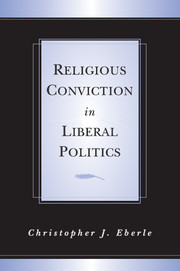Book contents
- Frontmatter
- Contents
- Acknowledgments
- PART ONE RELIGION AND RESTRAINT
- PART TWO WHY RESTRAINT?
- Introduction to Part Two
- 4 What Respect Requires
- 5 What Respect Does Not Require
- 6 Religion, War, and Division
- Concluding Comments on the Normative Case for Restraint
- PART THREE WHAT IS PUBLIC JUSTIFICATION?
- Concluding Comments
- Notes
- Index
4 - What Respect Requires
Published online by Cambridge University Press: 18 December 2009
- Frontmatter
- Contents
- Acknowledgments
- PART ONE RELIGION AND RESTRAINT
- PART TWO WHY RESTRAINT?
- Introduction to Part Two
- 4 What Respect Requires
- 5 What Respect Does Not Require
- 6 Religion, War, and Division
- Concluding Comments on the Normative Case for Restraint
- PART THREE WHAT IS PUBLIC JUSTIFICATION?
- Concluding Comments
- Notes
- Index
Summary
INTRODUCTION
One of the fundamental intuitions animating justificatory liberalism strikes me as compelling: that “respect for persons” mandates important constraints on the reasons citizens may employ as a basis for their favored coercive laws. More particularly, the justificatory liberal correctly argues that since each citizen has an obligation to respect her compatriots, she has an obligation to pursue public justification for each of the coercive laws she supports. But that isn't all: a citizen's obligation to respect her compatriots imposes a variety of additional constraints on the reasons she properly employs as a basis for her favored coercive laws. The burden of this chapter is to identify those constraints and to show why each is required by the norm of respect. These constraints combine to form an ideal of conscientious engagement that each citizen ought to obey in political decision making and advocacy.
RESPECT FOR PERSONS?
I begin by explicating the conception of respect implicit in my understanding of respect for persons. I don't have in mind what Stephen Darwall has called appraisal respect, that is, the sort of respect that consists in a positive assessment of a person's character or some aspect thereof. The conception of appraisal respect won't do the work I require of it. One of the defining features of appraisal respect is that not every person deserves it. Appraisal respect is a “positive appraisal of an individual made with regard to those features that are excellences of persons.
- Type
- Chapter
- Information
- Religious Conviction in Liberal Politics , pp. 84 - 108Publisher: Cambridge University PressPrint publication year: 2002

